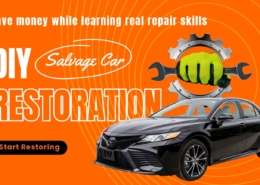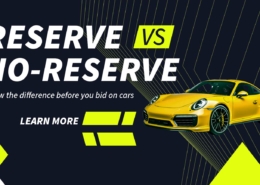 https://auction.ridesafely.com/images/2025/10/diy-salvage-car-restoration-save-money-skills-banner.jpg
865
1440
RideSafely
/images/2025/01/ridesafely-logo.svg
RideSafely2025-10-03 13:53:192025-10-03 16:36:26How to Save Thousands Restoring Salvage Cars Yourself
https://auction.ridesafely.com/images/2025/10/diy-salvage-car-restoration-save-money-skills-banner.jpg
865
1440
RideSafely
/images/2025/01/ridesafely-logo.svg
RideSafely2025-10-03 13:53:192025-10-03 16:36:26How to Save Thousands Restoring Salvage Cars YourselfWhen a vehicle sustains damage that exceeds a certain threshold of its market value, insurance companies may declare it a “total loss.” Afterward, the vehicle receives a salvage title. While this affects resale and insurability, a salvage title does not automatically render a car worthless; however, it may impact its value.
Key Insight:
A salvage title car typically holds 20% to 60% of its clean title market value, depending on several variables outlined below.
If you’re considering buying a salvage title car, it’s important to evaluate whether the potential savings outweigh the risks.
Key Factors That Influence Salvage Title Car Value
We detail below the primary factors that determine a salvage car’s worth:
1. Type and Extent of Damage
- Collision Damage:
Higher severity reduces value further. Frame damage is particularly detrimental. - Flood or Fire Damage:
These title types tend to fetch the lowest resale value — often as low as 10%–30% of clean value. - Recovered Theft:
Typically retains higher value than collision or flood salvage vehicles.
2. Make, Model, and Year
- Luxury or High-Demand Models:
Vehicles like Toyota, Honda, and certain BMW models retain stronger salvage value due to parts demand. - Age of Vehicle:
Newer models (less than 5 years old) tend to hold 40%–60% salvage value.
3. Location and Market Demand
- Salvage car prices vary by state.
- States like California and Texas show higher demand for repairable salvage vehicles.
4. Rebuild Status and Certification
- Rebuilt Title:
After repairs and inspections, a vehicle may receive a rebuilt title, increasing its value by 15%–30% over salvage-only title cars. To increase resale value, many owners aim to remove a salvage title by passing state inspections and obtaining a rebuilt classification.
5. Auction Trends and Bidding Behavior
- Online salvage auctions such as RideSafely, Copart, and IAA show clear price trends. Participating in salvage car auctions can be a profitable venture, especially when armed with strong pricing insights.
Typical Salvage Title Car Value Range by Category
| Vehicle Category | Estimated Salvage Value (% of Clean Title) |
|---|---|
| Economy Cars | 20%–40% |
| Luxury Cars | 30%–60% |
| Trucks and SUVs | 30%–55% |
| Electric Vehicles (EVs) | 25%–50% |
| Motorcycles | 15%–40% |
Understanding the differences between types of U.S. vehicle titles is critical when determining how much a salvage vehicle is actually worth.
Salvage Car Pricing Calculation Formula
Clean Title Market Value × Salvage Percentage = Salvage Title Value
Example:
- 2021 Toyota Camry LE
- Market Value: $19,910, based on the KBB Fair Purchase Price (National Average)
- Salvage Multiplier: 35%
- Estimated Salvage Value = $19,910 × 0.35 = $7,700
How to Accurately Determine Salvage Title Value
We recommend following these practical steps:
- Obtain Market Value Estimates:
Use websites like Kelley Blue Book (KBB) or Edmunds. - Inspect the Vehicle or Review Photos Thoroughly:
Review frame, suspension, electrical, and interior condition. - Check Auction Price Histories:
Leverage historical price data on websites like RideSafely. - Consult Certified Appraisers for High-Value Vehicles:
Particularly for luxury, collector, or rare models. - Contact the RideSafely Support Team:
Get in touch with RideSafely’s experienced team and ask, “How can I find out the price a car sold for at auction?” You can email our support team with the inventory number of the vehicle.
Salvage Title Value Impact by Insurance Category
| Insurance Category | Value Impact |
|---|---|
| Total Loss – Collision | High impact (40%–70% depreciation) |
| Total Loss – Theft | Moderate impact (25%–50% depreciation) |
| Total Loss – Flood/Fire | Severe impact (50%–90% depreciation) |
Please note: The Value Impact estimate depreciation percentage depends on various factors, such as damage type (e.g., front end, rear, mechanical, engine, etc.).
How Salvage Title Cars Are Priced in Online Auctions
| Step | Process Description |
|---|---|
| 1 | Insurance Declares Total Loss |
| 2 | Vehicle Sent to Auction |
| 3 | Inspection & Title Verification |
| 4 | Online Auction Listing |
| 5 | Bidding Phase |
| 7 | Final Sale Price Established |
| 8 | Buyer Collects Vehicle |
Auctions represent one of the purest ways to determine the value of an item. Supply and demand meet in real time to establish its fair market value. The seller and buyer agree to a fair exchange after competitive bidding determines the highest price anyone is willing to pay for the auction lot.
Conclusion: Salvage Title Cars Can Still Be Valuable
We emphasize that while salvage title cars are devalued compared to clean title vehicles, they still retain substantial value, depending on the type, damage, and market demand. Whether buying or selling, understanding these factors ensures fair pricing and informed decisions.
Explore vehicles and pricing insights through reputable online car auctions like RideSafely, which offer transparent auction access and up-to-date value benchmarks. Discover a diverse range of vehicles at RideSafely, including repairable salvage cars, clean title cars, and used cars—all available at great deals.
Salvage Title Car Value: Frequently Asked Questions
What percentage of a car’s value is lost with a salvage title?
Typically, a salvage title car is worth between 20% to 60% of its clean title market value. The exact percentage depends on factors like damage type, make and model, and rebuild status.
How do I calculate a salvage title car’s value?
Multiply the clean title market value by the estimated salvage percentage. For example, if the market value is $20,000 and the salvage multiplier is 35%, the estimated salvage value would be $7,000*.
Can a salvage title car regain full market value?
No. Even after repairs and obtaining a rebuilt title, most salvage cars retain 15%–30% less value than equivalent clean title vehicles due to buyer perception.
Is it legal to sell a salvage title car?
Yes, it is legal to sell a salvage title car, provided the title status is clearly disclosed to the buyer. Some states may have specific requirements regarding inspection or documentation.
Where is the best place to buy or sell a salvage title car?
Online salvage car auction platforms like RideSafely offer a wide selection of vehicles and competitive bidding environments, making them a preferred choice for buyers without a dealer license. For sellers, you can sell your salvage or used car quickly, safely, and easily through Copart—get an offer today. You can also check out IAA, which helps you sell quickly and get the best possible price. Complete the form here to get started.






Leave a Reply
Want to join the discussion?Feel free to contribute!